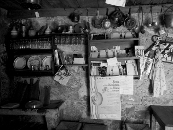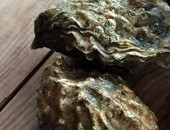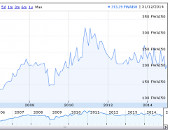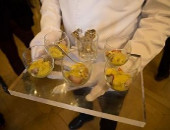The Vineyard
With 37 hectares (91 acres) of vines in a single, unbroken block, Cheval Blanc is a remarkable vineyard entity, located on the border of the Pomerol appellation. The combination of top-quality soil and an original mix of grape varieties gives the wine of Cheval Blanc a very powerful, unique personality.
The soil
Formed recently in geological terms, Cheval Blanc's soil is part of several areas shaped by the Isle River during the Quaternary period. Geologically speaking, Cheval Blanc is composed of terraces of tender rock strongly indented by erosion. This left room for extremely heterogeneous sedimentary deposits, resulting in a soil of a very complex mix.
The subsoil, starting at 80-90 cm (31-35ins), is essentially made up of clay and, in certain parts, gravel producing three main types of soil:
- sandy soil on clay subsoil
- gravelly soil on clay subsoil
- a deep layer of gravel
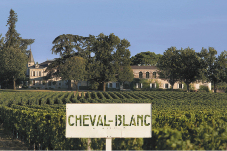 On the one hand, the composition of the subsoil, and in particular the clay, is very good for regulating water supply to the vine roots. This is also assisted by the major drainage work that has been carried out in the vineyard. On the other hand, the gravel and sand in the soil create a warm micro climate and a special eco-system that favours early ripening. In addition, the autumn rains inherent to an Atlantic climate generally have less of an influence here than in other parts of Bordeaux. Last, but not least, the naturally poor, pebbly soil keeps the vines in a permanent state of borderline nourishment, there by inducing a rich concentration in the grapes.
On the one hand, the composition of the subsoil, and in particular the clay, is very good for regulating water supply to the vine roots. This is also assisted by the major drainage work that has been carried out in the vineyard. On the other hand, the gravel and sand in the soil create a warm micro climate and a special eco-system that favours early ripening. In addition, the autumn rains inherent to an Atlantic climate generally have less of an influence here than in other parts of Bordeaux. Last, but not least, the naturally poor, pebbly soil keeps the vines in a permanent state of borderline nourishment, there by inducing a rich concentration in the grapes.
Grape varieties
The uniqueness of Cheval Blanc's mix of varieties lies firstly in the high proportion of Cabernet Franc (58%). In order to achieve the expression of quality required at Cheval Blanc, this variety must produce in low yields (35 hectolitres per hectare) and be picked slightly later than the Merlot. Cabernet Franc combines perfectly with Merlot (42%), the Cabernet Franc bringing aromatic complexity and the Merlot richness and softness.
Vine growing
Traditional soil cultivation: At Cheval Blanc, vines are grown according to the time-honoured tradition of the finest Bordeaux great growths. The golden rule is to avoid chemical herbicides, and to rely on the "quatre façons". This involves two deep ploughings to cover the bases of the vine trunks and two ploughings to uncover them. In spring, mechanised ploughing between the vine plants is finished off by hand.
As the harvest approaches, surface cultivation of the soil (with harrows or disk harrows) is reduced, to prevent rainwater from seeping into the soil and swelling the grapes.
Strict control of yields: Low yields of 35 to 40 hectolitres, for the vineyard as a whole, are needed at Cheval Blanc to achieve an optimum expression of the terroir through the wine. The high average age of the vines, which naturally encourages a low production, together with a certain number of vineyard practices, ensure that low yields will be obtained. Minimal use of fertilisers is also an important factor. The vines are provided with just enough nourishment in the form of organic fertilisers with low nitrogen content (e.g. peat).
Chemical fertiliser is only used for specific, isolated types of mineral deficiency. The "Riparia" rootstock has also been introduced at Cheval Blanc, further helping to keep yields down. Severe pruning, using the Guyot Simple and Guyot Double methods, is an important means of controlling production. After de-budding (the manual removal of unwanted buds), the "long cane" never has more than 4 to 6 buds with Guyot Simple and 3 to 4 buds with Guyot Double.
All of these activities are natural ways of concentrating flavour and richness in the wine. In years of great crops, however, crop thinning is necessary to keep the yields down to the desired level. This operation is carried out in July after a detailed analysis shows which plots are most likely to overproduce. Young vines and Merlot vines are those that are usually concerned.

